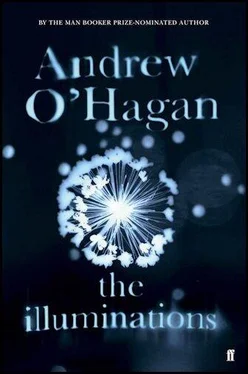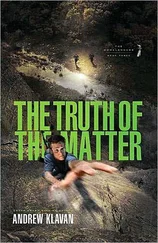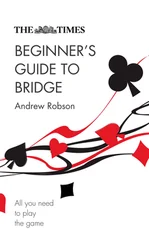spoke Scullion.
‘Keep going, Charlie.’
‘Oh, fuck,’ he said.
A bit of a tune came into it, nothing much, but Flannigan picked it up and Scullion got the words out.
‘In all kinds of splendour I’d live with my dear.’
‘Go on, lad. It’s a beauty.’
‘My name is Delaney, a name that won’t shame me.’
They had to make it to the top of the hill because there was nowhere for the chopper to land. Luke and Flannigan stayed at the side of the stretcher on the way up.
‘And if I’d had money, I’d ne’er had to roam,’
Flannigan sang. His eyes had filled up and he wiped the tears as they jogged. Over his shoulder Luke could see that the convoy had broken through and was at the gates of the dam and the trucks were rolling down.
‘But drinking and sporting,’
whispered Scullion,
‘night rambling and courting …’
‘Go on, sir,’ said Flannigan.
‘Keep it together, Charlie,’ said Luke.
‘Are the cause of my ruin and absence from home.’
In the waiting room, Alice looked at the frosted glass and wondered why receptionists are always so impatient and puffed up. Always, she thought. Did they want to be doctors themselves, and that’s why they hate giving out forms and taking calls about appointments? It made sense. You don’t want to spend your life feeling secondary to the person upstairs. It pleased Alice to allow a thought like that to flourish silently in a boring room, as if she had now become, at this point in her life, a lesson to herself, the kind of person on whom no small thing is wasted.
‘I’m not sure,’ Dr Sabin said. ‘It’s complicated.’ He had taken to wearing tweed jackets and knitted ties. He offered Alice a mint from a little vintage tin showing a smiling kid and a Union Jack. ‘The truth is we’re all getting older and your mother is eighty-two.’
‘It’s the hallucinations, as I call them,’ Alice said. ‘It comes and goes all the time. Some days she’s quite normal. But yesterday she was talking as if it was the 1960s. Just talking about the bands and the short skirts, you know. Not recalling it but blethering to me, and to Maureen, her neighbour, as if it was all happening now. I mean, that’s quite hard to take when the person was always so — well, intelligent, I’d call it. My mother has always behaved as if the truth was the biggest thing. The photographs she took when she was young were all about that.’
‘Was that her skill, taking photographs?’
Alice looked at the window and sighed. People’s offices always said so much about them, the old, soothing prints, the sweets, the boxes of wine glasses sitting on the filing cabinet. ‘Oh yes,’ she said. ‘It’s a sad story, really. Sad, I’d call it. She was a name. A bit of a name. Anne Quirk. Her photographs still turn up in a few collections.’
‘Really?’
She looked at him. She waited. ‘Anyway, she gave it up. Then she started going to Blackpool just before I was born and she met the man who must be my father.’
‘You didn’t know him?’
‘I saw him a few times. His name was Harry. She met him at a night school or something. A young woman who’d lost her goal. And suddenly there was this Harry and he was a photography lecturer in Manchester. He was in with that group of young photographers who were out on the streets and in the factories, you know, recording it all, and it gave her another chance. She was the only woman — I mean, among the photographers.’
‘They didn’t get married?’
Dr Sabin found it interesting to talk to somebody who didn’t have angina or a common complaint. People tend to forget you’re human when you’re a doctor and what he liked most was conversation. So the appointment with Alice ran on, the doctor wishing to expand his knowledge of this strange family who had travelled the world, who had talent, stories. The old mother was even quite famous, she was saying.
‘No, they were never married. She got pregnant. She’s got some information about Harry written down. I think he wrote it.’ Alice shook her head and the silence that came said enough.
‘We can move on if you like.’
‘It’s hard to talk about. It’s hard to know what’s true. Harry was a war hero. Harry flew the spy planes. But I’ve never seen any of the medals she talks about.’
‘They’re a bit overrated, those things,’ he said. She chose to ignore the doctor’s easy familiarity with all the world’s predicaments and situations. He was a bit like that. She came quite regularly to see him and always left feeling better, but it annoyed her the way he found every problem so familiar. It was clearly a part of his effort at cheerfulness and she found herself hoping he was a secret drinker.
‘Other people’s great deeds,’ Dr Sabin said. ‘They’re sometimes a bit hard to take. I know I find that.’
‘I was never able to ask.’
‘Why’s that?’
‘Because, you know, the truth is so obvious to some people that they don’t feel the need to share it. In fact, they resent being asked about it. They just want everyone to behave as if their story is the only story. And the people who ask questions in that situation are treated like traitors. It’s a form of control and a kind of bullying.’
‘You describe it very well.’
‘I’ve had it all my life.’
He told her to take her time. Sometimes Alice would just shudder at the memory of things. ‘Okay?’ he asked.
‘She always left me with other people. I was really brought up by the neighbours.’
‘Is that right?’
‘Yes. It’s a thing in Glasgow. Somebody should write a book about the role of the next-door neighbour. She’s got the same thing again with some woman who lives next door to her now. Maureen, she’s called. We don’t really know anything about her,
though she’s learning a lot about us, I’m sure. Same old story: the neighbour’s in charge.’
‘And you can’t speak to your mother about the past?’
‘Too late, doctor. Too late. For years I tried to please her and be more like her. She thinks I’m boring, I’m conventional, and I am those things, to people like her. Married to the wrong person. Too interested in the wrong things. You know. But the fact is, my existence threatens her story. I used to think she might love me more by realising I was all she had left of Harry. But that’s not true, Dr Sabin. My father has never gone because the great story of him only grows and grows.’
‘You feel you’ve been overshadowed?’
‘You can say that again.’
‘Really?’
‘Oh, yes. I’ve been sacrificed.’
‘You might be wrong.’
‘Maybe. I used to think it would be possible, one day, to get back to a kind of reality — you know, about her own achievements, her photographs, everything she did. But it wasn’t possible. She just transferred her worship of Harry onto my son, Luke. She always wanted a son. He’s always been close to her and now he’s coming back.’
‘He’s been in Afghanistan?’
‘He discharged himself. Or something like that. And now she’s so far gone it’s like all her fantasies coming home to roost. None of the lies were shot down or set to rights, and I didn’t get to talk. I didn’t get to ask about my father or get a grip on the past.’
‘Their past.’
‘It’s my past, too,’ she said.
‘I see.’
‘I will never be able to ask her.’
‘And that’s important to you?’
‘It was. But it’s too late.’
‘Her life’s not over,’ Dr Sabin said. ‘And yours is very far from being over, Alice. We’ll keep talking.’ He stood up and walked to the window and stood looking out at the sea. ‘We have a lot of it now, with the ageing population,’ he said. ‘And dementia presents insidiously, so that patients, carers, family — doctors, too — we all find ourselves only slowly understanding it. But it’s true that dementia can dramatise some of the issues the patient might have had with memory and so on.’
Читать дальше











